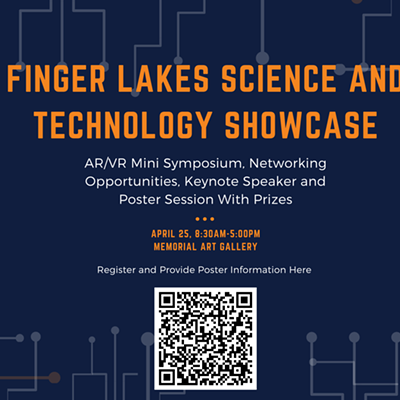[
{
"name": "500x250 Ad",
"insertPoint": "5",
"component": "15667920",
"parentWrapperClass": "",
"requiredCountToDisplay": "1"
}
]
It's not easy to talk about climate change.
The fundamental premise sounds simple enough: decades of burning fossil fuels has unleashed vast amounts of carbon emissions into the atmosphere, causing global warming. But start getting into details about shifting precipitation patterns or cutting carbon emissions and people tune out. A small percentage will even insist that climate change isn't a problem, despite overwhelming scientific evidence to the contrary.
Susan Spencer, a Rochester Institute of Technology Ph.D. student studying microsystems engineering, says she wants to talk to people about global warming. She says she wants them to understand that climate change is a serious problem and that workable solutions exist — solar energy, for example. For the past four years, Spencer has been researching ways to improve organic solar cells at the molecular level, and is defending the thesis she wrote on that work.
"Not only do I care passionately about it [renewable energy] from an environmental perspective, I care enough about it that I've made it my career and my life purpose," she says.
Earlier this summer, Spencer flew to Australia to spend two days in a training session led by former Vice President Al Gore and his Climate Reality Leadership Corps. She learned to use a massive slideshow that Gore developed for public presentations, and how to adapt it for different audiences. And she learned that it's important to speak about climate change with both gravity and optimism.
Since returning, Spencer has used Gore's slideshow during presentations she's given in the Rochester area. She lays out the basics of climate change, and spells out the challenges for the Rochester region.
But she also highlights how Rochester's manufacturing backbone, particularly Eastman Business Park, could be repurposed for solar development and manufacturing. That's the optimistic part of her pitch: Solar power is cleaner power, she says, but it also creates jobs and can drive economic growth. And that's right in line with the vision that local elected and economic development officials articulate for the business park.
"We want to be at the forefront of this technology and we are getting leapfrogged by China," Spencer says.
But signing up to be a Climate Reality Leader is about more than talk. Spencer committed to 10 "Acts of Leadership," which can be just about anything that advances the climate action cause. For example, she's working with the Girl Scouts of Western New York — she leads her 13-year-old daughter's troop — to incorporate climate change into its science, technology, engineering, and math program.
Spencer is also working with the Rochester People's Climate Coalition, which is assembling a local contingent to participate in the People's Climate March on September 21 in New York City.
Ultimately, Spencer says that her role is to share and spread the facts about climate change and to be someone that the public, elected leaders, and planners can go to with questions.
"I think that can make a huge difference," she says. "When you have somebody in front of you who has willingly committed to be there and is interested in helping you understand, I think people are really receptive to that."
We recently spoke with Spencer about climate activism. An edited version of that conversation follows.
CITY: The training sounds like it was geared toward people already engaged in climate issues. Who attended?
Spencer: It was a mix of scientists, business leaders, students, teachers, social activists, environmentalists. And these were all people [who] had already done some volunteer work, so having already demonstrated a commitment and passion to doing something in their communities, as well as a commitment and passion to the cause of solving the climate crisis. So we all kind of had the same mentality, but there were radically different backgrounds.
At my table, I was with a woman from Pakistan — she was a university professor. [There was an] Indian woman living in Hong Kong — she's a stay-at-home mom, an activist; a Nepalese man living in Hong Kong who was a retired physician who now works with music charities; and then another guy who lives in Nepal, a guy from the UK, and then a guy from Afghanistan.
Talking about global warming in a way that gets people to listen is difficult. What did you learn about communicating on climate change?
They stress that you have to speak about this simply but truthfully. The key things to get across are that global warming is real, humans are causing global warming, global warming is the main cause of the climate crisis, and that there are solutions that we can take now to mitigate the effects.
It's absolutely critical to have a balance between communicating the dangers and the realness of the situation, but also infusing it with some hope. We try to get people aware and inspired and excited to make change.
Al Gore's message has shifted significantly — and this is my interpretation, obviously. He used to talk a lot about individual steps: change your light bulbs, drive a hybrid car, make sure your lights are off when you leave the house. Those are all great things; we should all be doing those.
But the climate leaders, we've also been tasked with getting a groundswell of popular support for meaningful policy action. We're also there to educate, inspire, and bundle together voices. So, act as a conduit, act as a funnel for all of these people who do believe that climate change is real, because a lot of people do.
How should climate activists deal with deniers? Did the training address that?
Before I went to this training, I was against engagement. I did not support Bill Nye debating the creationist because you've given them equal time; you've let them share their views.
But the thing that Mr. Gore said was, if there's one person out there listening who changes their mind because you debated, because you engaged, that's a success story. And the likelihood is there's going to be more than one. Even if you're just shaping their perceptions of how this problem needs to be addressed or how this problem was caused, that's an impact.
It sounds like your interest in climate change and solar energy dovetail. How much potential does solar have for addressing climate change?
I think that all renewable energy technologies need to be used, but solar power comes from the biggest source of energy in our solar system. In one day, the amount of photons that hit our planet can power every single home in the world for a year. It's free to access, it's not dangerous to deal with in any way, and it is all over the planet.
Water power and wind power rely on the presence of a nice, big river or a specific geographical feature that'll create lots of wind. Solar can be used anywhere — Germany proves that, right? It's not exactly the Riviera, but they've just gone to over 50 gigawatts [of solar electricity generated in a year], which is an enormous amount of production.










